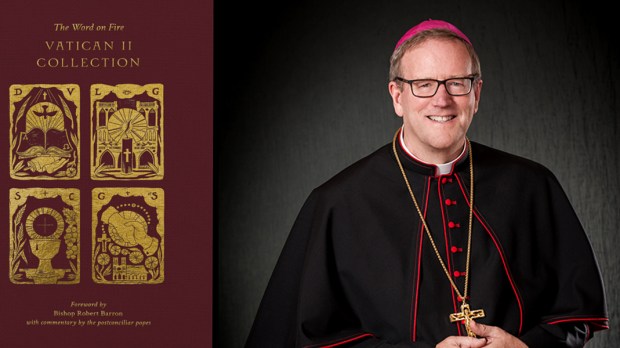The Church is changing the world, not the other way around — that is the message of the Second Vatican Council.
Bishop Robert Barron’s Word on Fire apostolate has just published the Vatican II Collection. It presents the council’s four key documents with commentary by popes and by Bishop Barron.
Reading through the documents made me think that what G.K. Chesterton said about Christianity could be said about Vatican II:
The Christian ideal has not been tried and found wanting. It has been found difficult; and left untried.
As Barron puts it:
I believe that the documents of Vatican II are still widely unread, and if they are read, often misunderstood. The needful thing, I am convinced, is a robust and enthusiastic reappropriation of the texts of Vatican II.
Let’s countdown from last to first the documents he presents in the book.
4: The Church confronts the world in Gaudium et Spes (Joy and Hope).
Bishop Barron writes that this “Constitution on the Church in the Modern World” “offers a beautiful vision of the Church going out to meet a modern world hungry for God.”
The Church doesn’t fear the world, but faces it confidently.
We don’t come hat in hand to this deeply ambiguous modern culture seeking to accommodate ourselves; rather we proclaim Christ in and to that culture.
That is certainly true of Gaudium et Spes. Early on, the document says,
Though mankind is stricken with wonder at its own discoveries and its power, it often raises anxious questions about the current trend of the world, about the place and role of man in the universe, about the meaning of its individual and collective strivings, and about the ultimate destiny of reality and of humanity.
Then it proceeds to address each of those enormous questions with language meant to be read by all of us, not theologians or specialists.
3: Meet the Vatican II Mass in Sacrosanctum Concilum, the constitution on the Sacred Liturgy.
For most of us, if we know anything about Vatican II, we know that it changed the Mass from Latin to the current vernacular version.
Bishop Barron is eager to present the words of Vatican II because, he says, “In the United States, over 60% of baptized Catholics regularly stay away” from Mass.
But this is not what the Vatican II fathers wanted! Turning to Sacrosanctum Concilium, we see a vision of a revitalized liturgy cultivating a vibrant Catholic culture that will draw the world to itself.
The constitution paints a picture of Mass as a reverent continuation of an ancient tradition, mostly in Latin, as the “source” and “summit” of a full Christian life that is mostly lived elsewhere.
2: Rediscover Scripture with Dei Verbum (Word of God).
Bishop Barron explains that the council’s document on Scripture is especially important. This is because “The Bible is often the prime reason why people, especially young people, are alienated from the Christian faith.”
Answering this, “The insights of Dei Verbum can help Catholics recover the depth and power of the Bible in the 21st century and hold off the many charges made against it.”
The Council promotes Scripture so that “by hearing the message of salvation the whole world may believe, by believing it may hope, and by hoping it may love.”
Barron’s apostolate at Word on Fire, along the rest of the Catholic scriptural renaissance, shows these words coming true.
1: The power of the Church shines in Lumen Gentium — light of the nations.
To introduce this document, Bishop Barron cites Hans urs von Balthasar, a theologian who influenced many of the Council Fathers.
“His argument, simply put, was that the Church was crouching too defensively behind its medieval walls,” he says. “Its treasures, which are meant for the world, were not being shared.”
This is the document with the stirring “universal call to holiness,” which says, “all the faithful of Christ are invited to strive for the holiness and perfection of their own proper state.”
Lay people “are called in a special way to make the Church present and operative in those places and circumstances where only through them can it become the salt of the earth.”
Seeing the deep problems in the world, God’s answer, in the documents of Vatican II, is us.

